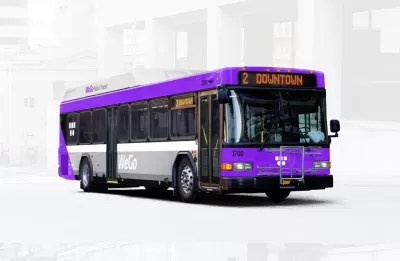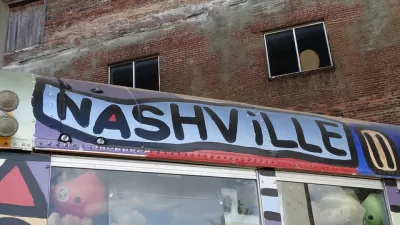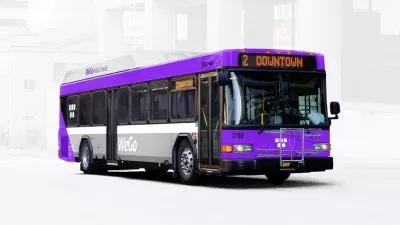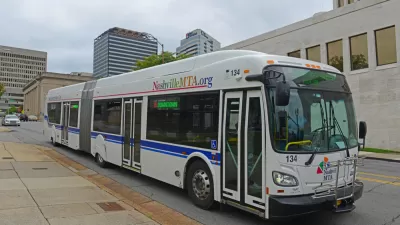Last spring, voters resoundingly quashed Let's Move Nashville, a $5.4 billion plan to build out the city's transit options. The plan paid too little attention to current riders, advocates say, and they aim to do things differently.

Former Nashville Mayor Megan Barry resigned amidst scandal last year, and with her went Let's Move Nashville, a transportation package that voters rejected by a 64% to 34% margin. TransitCenter calls the vote "a stunning defeat for a plan that consistently polled well and enjoyed support from the Chamber of Commerce and dozens of business and civic organizations." But as critics tell it, Let's Move Nashville suffered from major flaws besides its association with the former mayor.
For one thing, TransitCenter reports, "with 80 percent of the funds earmarked for building five light rail corridors and a tunnel through downtown, a relatively small percentage was left over for bus and pedestrian improvements"—the kinds of projects current transit riders actually want. Some associated the plan with an overeager appetite for transit-oriented development, stoking gentrification fears.
In the year since, "transit supporters regrouped, determined to grapple with what went wrong and learn from past mistakes. A year after the vote, a new coalition is reviving the transit conversation in Nashville." They include the advocacy groups behind the Nashville Community Transportation Platform and a broad coalition including business groups called Connect Mid TN.
The new coalition wants to place greater emphasis on community engagement, which they say was definitively lacking last time. But they may have to contend with lackluster backing from city leaders like Mayor David Briley, "whose support for transit is lukewarm at best."
FULL STORY: Nashville Emerges From the Transit Ashes

Study: Maui’s Plan to Convert Vacation Rentals to Long-Term Housing Could Cause Nearly $1 Billion Economic Loss
The plan would reduce visitor accommodation by 25,% resulting in 1,900 jobs lost.

North Texas Transit Leaders Tout Benefits of TOD for Growing Region
At a summit focused on transit-oriented development, policymakers discussed how North Texas’ expanded light rail system can serve as a tool for economic growth.

Using Old Oil and Gas Wells for Green Energy Storage
Penn State researchers have found that repurposing abandoned oil and gas wells for geothermal-assisted compressed-air energy storage can boost efficiency, reduce environmental risks, and support clean energy and job transitions.

Private Donations Propel Early Restoration of Palisades Playground
Los Angeles has secured over $1.3 million in private funding to restore the Pacific Palisades playground months ahead of schedule, creating a modern, accessible space that supports community healing after recent wildfires.

From Blight to Benefit: Early Results From California’s Equitable Cleanup Program
The Equitable Community Revitalization Grant (ECRG) program is reshaping brownfield redevelopment by prioritizing projects in low-income and environmental justice communities, emphasizing equity, transparency, and community benefits.

Planting Relief: Tackling Las Vegas Heat One Tree at a Time
Nevada Plants, a Las Vegas-based nonprofit, is combating the city’s extreme urban heat by giving away trees to residents in underserved neighborhoods, promoting shade, sustainability, and community health.
Urban Design for Planners 1: Software Tools
This six-course series explores essential urban design concepts using open source software and equips planners with the tools they need to participate fully in the urban design process.
Planning for Universal Design
Learn the tools for implementing Universal Design in planning regulations.
Ascent Environmental
Borough of Carlisle
Institute for Housing and Urban Development Studies (IHS)
City of Grandview
Harvard GSD Executive Education
Toledo-Lucas County Plan Commissions
Salt Lake City
NYU Wagner Graduate School of Public Service





























